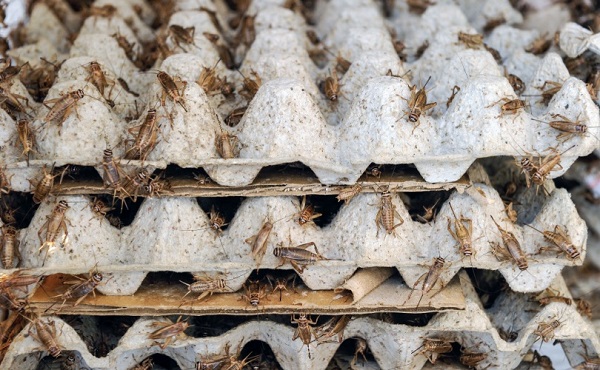Business
Canadian farm producing consumable crickets lays off two-thirds of its employees

From LifeSiteNews
The workforce reduction at a London, Ontario, facility that received $8.5 million in government funding appears to be a sign that Canadians do not have an appetite for bugs.
It appears Canadians’ taste for eating food made from bugs is not in high demand after news broke that a farm given millions by the federal government to raise crickets for “human and pet consumption” laid off two-thirds of its staff.
The cricket farm in London, Ontario, run by the Aspire Food Group just broke ground on a new 150,000-square-foot facility last year. The company said it was cutting shifts and going from 150 workers to 50.
In comments made to the trade news outlet AgFunderNews, company CEO David Rosenberg said the layoffs are due to making “improvements to its manufacturing system.”
The fact the company is already cutting costs in dramatic fashion comes only a short time after Canada’s federal government under Prime Minister Justin Trudeau contributed $8.5 million to it in 2022.
The cricket farm when fully operational can make 13 million kilograms of crickets for “human and pet consumption.”
It was given widespread coverage several years ago by Canada’s state-funded CBC, which billed it as the “world’s largest cricket production facility.”
Aspire’s pitch that its food had a lower environmental footprint than protein from cattle or pigs was in lockstep with the radical environmental goals of the Trudeau government as one of the reasons it landed a large grant.
According to AgFunderNews, only a year ago Aspire claimed its factory would be working at 100 percent by the start of 2024.
“We have significant contractual commitments for the majority of our production and expect 100% will be sold within the year,” former CEO Mohammed Ashour told AgFunderNews in March 2023.
Groups such as the Canadian Taxpayers Federation (CTF) blasted the federal government for subsidizing companies that make food out of crickets for human consumption, saying it amounts to giving Canadians “their ‘let them eat crickets’ moment.”
Both crickets and mealworms in recent years have been promoted by global elites as a source of protein that they say could replace beef or pork, and which can also be used in a variety of foods.
Indeed, the Great Reset of Klaus Schwab and his World Economic Forum (WEF) has as part of its agenda the promotion of eating bugs to replace beef, pork, and other meats that they say have high “carbon” footprints.
Conservative Party says layoffs at bug factory show ‘Canadians will not eat bugs’
The Conservative Party of Canada in an email to members said that the news regarding Aspire cutting most of its staff is proof that Canadians “will not eat bugs.”
“Justin Trudeau bet $9 million of your money on edible BUGS! He wants Canadians to own nothing, be happy, and eat crickets,” the party said in the email.
“But his bet failed. The company he invested YOUR tax dollars in has dramatically cut production and fired two-thirds of their staff. Turns out, Canadians don’t want to eat bugs.”
In 2022, Conservative MP Leslyn Lewis blasted the current cancel-culture crusade against red meat by pushing bugs as a source of food and the Trudeau government for funding bug factories.
The Trudeau government has implemented many policies that align with the WEF’s so-called “climate change” agenda, including a punishing carbon tax, and attacks on the nation’s oil and gas industries.
According to records, since 2018, a total of $420,023 has been spent on helping multiple food companies that make human bug food.
At the same time, the Trudeau government has begun to attack Canadian farmers by pushing forth an agenda that would force them to reduce the amount of nitrogen-based fertilizer. This could have a large negative impact on the growing of feed for cattle as well as food for human consumption.
Aspire is not the only factory in Canada breeding bugs to turn them into food for both human and animal consumption. The CTF listed all of the cricket processing companies that receive corporate welfare.
Dr. Joseph Mercola, in a blog posted by LifeSiteNews, documented how Schwab’s Great Reset agenda looks to force the world’s population to, by pressuring local governments, make people “consider eating bugs and weeds and drink ‘reclaimed’ sewage.”
Business
Publicity Kills DEI: A Free Speech Solution to Woke Companies

For years, major corporations bragged about their wonderful Diversity, Equity, and Inclusion (DEI) programs. They’re good for business and morally correct, they said. So why are they now cutting those programs?
Robby Starbuck says these programs once got a lot of buy-in, because people wanted to be nice! But DEI came to mean much more than just being nice.
Starbuck says what it looked like in practice was “crazy trainings” and “overtly racist hiring practices.” Now lots of people agree with him.
Companies actually take notice when Starbuck tells his many followers about their DEI programs. Often the programs get dropped.
That’s the power of free speech.
After 40+ years of reporting, I now understand the importance of limited government and personal freedom.
——————————————
Libertarian journalist John Stossel created Stossel TV to explain liberty and free markets to young people.
Prior to Stossel TV he hosted a show on Fox Business and co-anchored ABC’s primetime newsmagazine show, 20/20. Stossel’s economic programs have been adapted into teaching kits by a non-profit organization, “Stossel in the Classroom.” High school teachers in American public schools now use the videos to help educate their students on economics and economic freedom. They are seen by more than 12 million students every year.
Stossel has received 19 Emmy Awards and has been honored five times for excellence in consumer reporting by the National Press Club. Other honors include the George Polk Award for Outstanding Local Reporting and the George Foster Peabody Award.
_ _ _ _ _ _ _ _
To get our new weekly video from Stossel TV, sign up here: https://www.johnstossel.com/#subscribe
_ _ _ _ _ _ _ _
Business
DOGE discovered $330M in Small Business loans awarded to children under 11

 MxM News
MxM News
Quick Hit:
In a bombshell revelation at a White House cabinet meeting, Elon Musk announced that the Department of Government Efficiency (DOGE) had uncovered over $330 million in Small Business Administration (SBA) loans issued to children under the age of 11.
Key Details:
- Elon Musk stated that DOGE found $330 million in SBA loans given to individuals under the age of 11.
- The youngest recipient was reportedly just nine months old, receiving a $100,000 loan.
- SBA has now paused the direct loan process for individuals under 18 and over 120 years old.
Diving Deeper:
At a cabinet meeting held Monday at the White House, President Donald Trump and Elon Musk detailed a staggering example of federal waste uncovered by the newly-formed Department of Government Efficiency. Speaking directly to ongoing efforts to eliminate corruption and abuse in federal agencies, Musk explained that the SBA had awarded hundreds of millions in loans to children—some of whom were still in diapers.
“A case of fraud was with the Small Business Administration, where they were handing out loans — $330 million worth of loans to people under the age of 11,” Musk said. “I think the youngest, Kelly, was a nine-month year old who got a $100,000 loan. That’s a very precocious baby we’re talking about here.”
DOGE’s findings forced the SBA to abruptly change its loan procedures. In a post on X, the department revealed it would now require applicants to include their date of birth and was halting direct loans to those under 18 and above 120 years old. Musk commented sarcastically: “No more loans to babies or people too old to be alive.”
The discovery was just the latest in a series of contract cancellations and fraud crackdowns led by DOGE. According to Breitbart News, DOGE recently canceled 105 contracts totaling $935 million in potential taxpayer liabilities. The agency’s website currently lists over 6,600 terminated contracts, accounting for $20 billion in savings.
The president praised Musk and DOGE for rooting out government inefficiencies, noting his administration was focused on “cutting” people and programs that were not working or delivering results. “We’re not going to let people collect paychecks or taxpayer funds without doing their jobs,” Trump said.
Also during the cabinet session, USDA Secretary Brooke Rollins revealed her department had eliminated a $300,000 program aimed at teaching “food justice” to transgender and queer farmers in San Francisco. “I’m not even sure what that means,” Rollins said, “but apparently the last administration wanted to put our taxpayer dollars towards that.”
These revelations highlight what many conservatives have long suspected—that during prior administrations, including under President Joe Biden, massive amounts of federal funding were funneled into unserious, ideologically-driven projects and mismanaged government programs. Under the Trump administration’s second term, DOGE appears to be living up to its mission: trimming fat, exposing fraud, and putting American taxpayers first.
-

 Alberta1 day ago
Alberta1 day agoFederal emissions plan will cost Albertans dearly
-

 International21 hours ago
International21 hours agoEurope Can’t Survive Without America
-

 Business2 days ago
Business2 days agoPossible Criminal Charges for US Institute for Peace Officials who barricade office in effort to thwart DOGE
-

 Business13 hours ago
Business13 hours agoWhy a domestic economy upgrade trumps diversification
-

 2025 Federal Election1 day ago
2025 Federal Election1 day agoCanadian construction worker goes viral for saying he refused to shake Mark Carney’s hand
-

 Health1 day ago
Health1 day agoDr. Pierre Kory Exposes the Truth About the Texas ‘Measles Death’ Hoax
-

 Business7 hours ago
Business7 hours agoDOGE discovered $330M in Small Business loans awarded to children under 11
-

 Business1 day ago
Business1 day ago28 energy leaders call for eliminating ALL energy subsidies—even ones they benefit from






